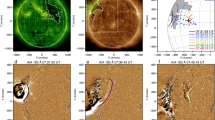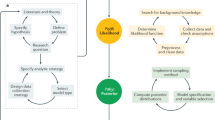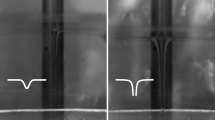Abstract
THEORETICAL calculation of the interaction between fast electrons and hydrogen atoms (Bethe, Williams1, etc.) predict an increase of primary ionization when the energy of the incident particle exceeds about one million electron-volts. Wilson chamber experiments have not yet given quantitative results of sufficient precision to ascertain if that increase is real or not.
This is a preview of subscription content, access via your institution
Access options
Subscribe to this journal
Receive 51 print issues and online access
$199.00 per year
only $3.90 per issue
Buy this article
- Purchase on Springer Link
- Instant access to full article PDF
Prices may be subject to local taxes which are calculated during checkout
Similar content being viewed by others
References
Williams, Science Progress, 121, 915 (1936).
” Etude des compteurs ”, Bull. Tech. A.I. Bruxelles (1936).
NATURE, 138, 284 (1936).
Stahel, Thesis, Zurich (1922).
Danforth and Ramsay, Phys. Rev., 49, 854 (1936).
Tuwim, L., J. Phys. Rad., 3, 614–620 (1932).
Cosyns and de Bruyn, Bull. Acad. Belg., 20, 371 (1934).
Kolhörster, W., and Tuwim, Naturwiss., 19, 917 (1931).
idem., Z. Phys., 73, 130 (1931).
Author information
Authors and Affiliations
Rights and permissions
About this article
Cite this article
COSYNS, M. Specific Ionization by High-speed Particles. Nature 139, 802–803 (1937). https://doi.org/10.1038/139802b0
Issue Date:
DOI: https://doi.org/10.1038/139802b0
Comments
By submitting a comment you agree to abide by our Terms and Community Guidelines. If you find something abusive or that does not comply with our terms or guidelines please flag it as inappropriate.



